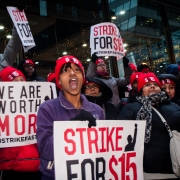During the years of the great recession, when many millennials were coming of age, economics and statisticians began to grow concerned over the number of young people who were dropping out of the labor force or had never entered it at all.
However, what many discovered was that the recession had very little reason to do with these declining rates. In fact, the decrease in youth employment began before the 2008 financial crisis. The numbers actually show that youth employment rates fell from 24 percent to 13.2 percent between 1994 and 2009.
Attempting to discover why teenage employment rates have been decreasing, the Mercatus Center at George Mason University conducted a study. During the course of their research conducted by David Neumark and Cortnie Shupe, the two scholars looked at three different possible reasons for this decline: increased numbers of adults attending school, increased competition with immigrants, and an increase in the minimum wage.
The Research
While both schooling and increased job competition with immigrants both played negligible roles, the latter playing a slightly bigger role than the former, the main culprit was the minimum wage. As the study states:
“In terms of explaining changes in the behavior of teens age 16–17 since 2000, the role of the minimum wage is predominant.”
But oddly enough, many studies of this nature discount, or completely neglect, the role the minimum wage plays in the decreased numbers of youth employment. As the study says:
“Curiously, the role of minimum wages has been largely ignored in this context, despite the extensive literature on the effects of minimum wages on teenage employment (although the conclusion is contested)12 and the much smaller body of literature on the effects of minimum wages on schooling…”
Neglecting to discuss the role the minimum wage plays in decreased teen employment does a huge disservice when it comes to tackling the actual problem.
The fact is when employers are forced to comply with high minimum wage rates they have to choose between hiring unskilled, young workers or older workers who will need less training. In this case, they will almost always choose the latter. It makes more financial sense for them, especially since both workers are now more expensive due to mandatory minimum wages.
So as the push for higher wages began, fewer teens were finding employment because it was simply too risky and too expensive to hire these unskilled workers. However, those advocating for these policies continued to push for higher wages under the guise that it helped American workers of all ages. But the continued decrease in teen employment told a different story.
The Inconvenient Truth of Increased Minimum Wage
When policymakers consider raising the minimum wage, it always comes down to discussing whether the increased paycheck is offset by the increase in overhead labor cost. For example, is an employee earning more per paycheck enough to balance out the increase in cost the employer will have to endure in order to make this larger paycheck possible. While most free-market economists understand that this is not the case, the emotional argument for increased wages usually beats out logic.
Many proponents of raising the minimum wage also claim that it gives young adults a greater opportunity to learn and grow as employees. This, it is believed, sets them up for later success as they expand their careers. But this, as it turns out, is not the case.
One of the most interesting aspects of this study was that it found that for the teens who were able to enter the workforce, an increase in wages led to fewer skills obtained by the time these teens reached adulthood.
As the study states:
“Turning to the second question, our examination of the longer-term effects of these three factors uncovers no evidence that higher minimum wages, which underlie teens shifting from combining work and schooling to being in school exclusively, led to greater human capital investment. If anything, the evidence is in the other direction. Thus, it is more likely that the principal effect of higher minimum wages in the 2000s, in terms of human capital, was to reduce employment opportunities that could enhance labor market experience.”
Herein lies one of the problematic issues with raising the minimum wage. Entry level jobs are just that: entry level. They are meant to help young workers earn the skills necessary to move up the latter in their desired fields. But this increase leads to entitlement, where workers are not paid for their individual skills but are instead bumped up to the level of more experienced workers. Clearly, this has been detrimental to the individual’s overall growth, as the research also demonstrates.
But in general, increased minimum wages have implications that expand beyond just these consequences. As we have already seen happen in the wake of “fight for 15,” employers who are forced to increase the wages paid to employees have to find their own ways of offsetting these costs. This can mean laying off workers or increasing the price of consumer goods, in which case nobody really benefits. But again, the emotional arguments go a long way with legislators, who would rather appease protestors than think about economic logic.












